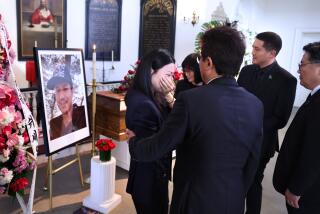Fearing for Mentally Ill Son’s Future
- Share via
Peter Lovoy of Long Beach doesn’t project a hint of what he’s been through. At 82, with a bad ticker and never-ending worries about his ill son, the former Weber’s bread truck driver has perfected the art of suffering in silence.
His chief concern these days, hidden by a smile, is that his 53-year-old son might not be able to fend for himself when Lovoy is gone.
“I haven’t got much time, I guess, so I better get him situated,” Lovoy tells me in the living room of his home near the Cal State Long Beach campus.
His son Dennis, the second of three, was diagnosed with schizophrenia and severe depression nearly 30 years ago. Since then, he’s been in and out of hospitals, occasionally homeless and always in psychic pain. He’s been a source of constant frustration for his loving, tormented, exhausted family.
I could have traveled in any direction and found a nearly identical story. Since I began writing about a schizophrenic classically trained downtown Los Angeles musician who uses a violin case as his skid row pillow, my mailbox has been crammed with dozens of tales from readers who see their own experience in that of Nathaniel Anthony Ayers and his family.
The e-mail from Mr. Lovoy’s wife, Dolores, caught my attention because they were desperate for a referral to someone, anyone, who might be able to help.
“My dear husband has worked tirelessly trying to help Dennis with psychiatrists, various agencies, buying him cars, helping him financially, etc.,” wrote Dolores. “We are his only friends.”
This is fairly typical, in my experience. A decades-long struggle with no reliable help, no end in sight, and no idea where to turn. Mental illness carries a huge stigma. It makes people uncomfortable. And that means it’s a disease without weekend 10K runs to raise money for research, treatment or awareness.
The Lovoys, like many families in their situation, had never heard of NAMI (the National Alliance for the Mentally Ill), a support and advocacy group. Mr. Lovoy said he never had the money for private treatment and didn’t know how to even begin to figure out what public services were available.
That’s partly because for more than three decades, they’ve been virtually nonexistent, even as skid row populations have grown.
As I pulled up to the Lovoy house, a middle-aged man sitting in a car watched me intently. He seemed to be studying my every step as I strolled down the sidewalk and up the walkway. Then he drove away.
Inside, Mr. Lovoy tells me that was his son. Dennis had come by for breakfast and was returning now to his studio apartment. He recently lost a job breaking down cardboard boxes at Ralphs.
That’s the way it goes with Dennis. He wants to work, but his illness always gets in the way.
Mr. Lovoy hopes he doesn’t follow through on a plan to move out of the apartment and into his car.
Dolores Lovoy joins us in the living room and watches her husband tell the story of the storm that visited the Lovoy family 40 years ago and never left. Peter had grown up in East Los Angeles, and he and his first wife, Kathleen, were living in Pico Rivera when she was rushed to the hospital one night to have their third child. The baby was fine, but Kathleen Lovoy went into diabetic shock, suffered brain damage and never recovered.
Dennis, 10 years old when his mother took ill, was particularly devastated. She had doted on him, praising his straight-A report cards, and suddenly his beloved mother sat before him without expression or recognition, as if she had moved out of her own body.
“Dennis would go into the refrigerator and get something to eat, and my wife would say, ‘Who is that and why is he eating our food?’ ” Mr. Lovoy says.
Dennis became a loner in his teens, shunning friends and locking himself in his bedroom. He enlisted in the military in his 20s, came home after two years and paced nervously in the backyard for hours on end. His mental illness was diagnosed not long afterward. At one point he was hospitalized for six months. Sometimes he seemed better.
“It’s like it’s raining every day,” he told his family.
“It puts you through the wringer,” says the white-haired Mr. Lovoy, his kind, bespectacled face beginning to give up some of the pain.
I tell the Lovoys that as I understand it, mental illness visits only those with a genetic predisposition, although it can certainly be affected by events. No shortage of traumatic events for Dennis.
Kathleen Lovoy died 10 years ago and Mr. Lovoy married Dolores, herself a widow at the time. Dolores seizes on my comment about the genetic component of mental illness, using it to salve her husband’s wounds.
“He feels guilty about what happened to Dennis,” she explains.
Like other parents of schizophrenics, Mr. Lovoy torments himself wondering if he could have prevented Dennis’ illness. He can’t help but recall that because he had an invalid wife, a job he couldn’t afford to quit and three sons, he wasn’t able to give Dennis the attention that might have nurtured him. Mr. Lovoy was up at 4 every morning to prepare for work, relying on friends and family to help in his absence.
“I owe so many good friends,” he says, specifically thanking a neighbor named Abby Souza, who gave saintly attention to the boys and Mrs. Lovoy while Mr. Lovoy made bread deliveries to stores, schools and hospitals.
When Lovoy’s medical insurance ran out, he was humbled by the kindness of the customers on his route who took up collections.
“My competitors helped out with donations too,” he says. “The Wonder Bread guy, the Oroweat man.”
Lovoy would get home from work, prepare meals, bathe his wife, clean house, attend school events, hit the sack around midnight and roll out of bed again four hours later -- a routine that went on for years.
Lately, still the provider as an octogenarian, he’s been driving Dennis around looking for work. Dennis has SSI, but it’s not enough, and besides, Mr. Lovoy wants his son to learn how to handle the responsibility of a job.
“We’ve been to Disneyland, Home Depot, Lowe’s, Wal-Mart. We’ve filled out 20 or 30 applications, and nobody has called back yet.”
Sure, Dolores will be around when Mr. Lovoy is gone, and so will Dennis’ brothers. But nobody is able to relate to Dennis the way Mr. Lovoy does. He still tries to motivate Dennis by telling him that if he can drive and live on his own and carry on a conversation, he ought to be able to make himself more self-sufficient.
Dennis sounds like an obvious candidate for medication and regular therapy, but the cruel and ironic nature of his illness is that it often robs him of rational behavior.
“He’s not in the stream of life,” Mr. Lovoy says. “It’s crazy, but when you’re working with someone who’s mentally disturbed, you start to feel more and more like him.”
I give Mr. Lovoy the phone number for the NAMI branch in Long Beach, in case he needs advice, a referral or the company of countless others who rest uneasy at night, regretting the lost days. We also talk about the Village, a full-service Long Beach program he visited with Dennis after I wrote about it recently, and I tell Mr. Lovoy there’s some good news on the horizon.
Mental health services will vastly improve come January, thanks to hundreds of millions of dollars from Proposition 63, the 1% tax on California’s wealthiest residents. This could be a boost for the Village and dozens of other programs. And just last week, Proposition 63 proponents were ecstatic about an ambitious housing plan that could one day serve Dennis and put a roof over the heads of thousands who now curl up on the street at night.
The news brings a gracious smile to Mr. Lovoy, who can’t let go of the hope that one day, his son will find his way.
“It’s my duty,” he says. “I’m a father.”
*
Reach the columnist at steve.lopez@latimes.com and read previous columns at latimes.com/lopez.
More to Read
Sign up for Essential California
The most important California stories and recommendations in your inbox every morning.
You may occasionally receive promotional content from the Los Angeles Times.














